German actress Monika Gabriel (1943-2007) was known for her many DEFA films and her appearances in TV series in East Germany. From 1971, she worked in West Germany, mainly for television.
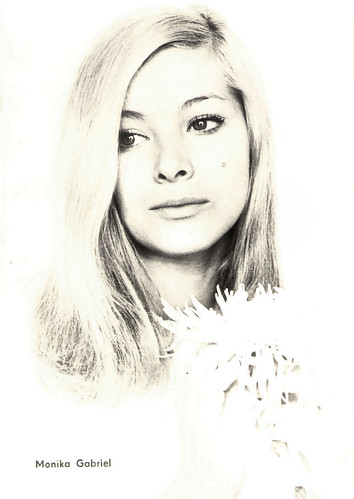
East-German postcard by VEB Progress Film-Vertrieb, Berlin, no. 3320, 1968. Photo: Schwarz.
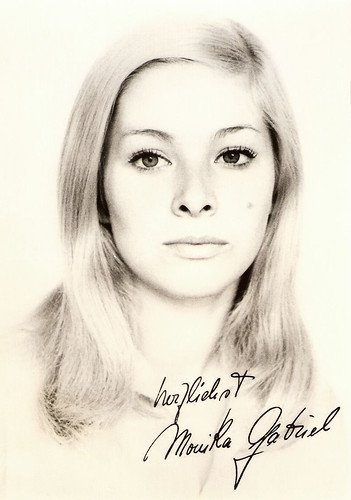
East-German postcard by VEB Progress Film-Vertrieb, Berlin, no. 3324, 1969. Photo: Schwarz.
Monika Gabriel was born in Eichenbriick, near Posen (now Poznań) in Germany (now Poland) in 1943. From 1949 on, she grew up in Falkensee, a city near the Baltic Sea, where she began to take ballet lessons at the age of eleven.
From 1957 to 1961 she trained as a professional dancer at the Academy for Artistic Dance and the Staatliche Ballettschule Berlin. From 1962 on, she also played small parts in stage productions at the Berlin Metropol Theater, where she was later transferred to major roles in musical productions like Cole Porter’s 'Küß mich, Kätchen!' (Kiss Me Kate).
However, she was known by the East German public for her roles in many film and television productions. In 1962, she made her film debut at the DEFA as a page in the fairy tale film Das Kleid/The Robe (Konrad Petzold, 1962) based on Hans Christian Andersen’s fairy tale The Emperor’s New Clothes. Sadly the film was banned by the GDR government as its planned release coincided with the building of the Berlin Wall. Officials saw the film as too critical of the state. In the next years, she played in the popular Stacheltier stunt film short s Stacheltier: Engel, Sünden und Verkehr/Porcupine: Angels, Sins and Traffic (Horst Seemann, 1963) and Stacheltier: Liebe braucht keine PS/Porcupine: Love Doesn’t Require HP (Horst Seemann, 1964).
Gabriel’s first major role was in Gerhard Klein and Wolfgang Kohlhaase’s Berlin um die Ecke/Berlin Around the Corner (1965), the fourth film in their Berlin Film series. At the East German Cinema Blog, Jim Morton writes: "Unfortunately, this was the same year that the 11th Plenum occurred. By the time the film was finished in 1966, the 11th Plenum had started their ‘Kahlschlag’ (literally ‘clear cutting’), and the film was promptly rejected and shelved. The officials called it ‘dishonest,’ which is an odd thing to say considering it’s one of the most honest films to ever come out of East Germany. They also called it ‘anti-socialist’—an even more absurd claim since the motivation of the main character is his desire to see equity achieved. (…) Like most of the films banned during the 11th Plenum, Berlin Around the Corner didn’t get an official release until after the wall came down, although it did receive a limited screening in 1987. It officially premiered in 1990 to positive reviews."
Next Monika Gabriel appeared in Ein Lord am Alexanderplatz/A Lord at Alexanderplatz (1967), Wir lassen uns scheiden/We’re Getting Divorced (Ingrid Reschke, 1967) about the impact of divorce on children, and Jungfer, Sie gefällt mir/Maiden, You Please Me (Günter Reisch,1969), with a script by Jurek Becker based on Heinrich von Kleist’s Der zerbrochene Krug. Monika Gabriel fell in love with her co-star in the film, the West German actor Wolfgang Kieling, who had recently moved to the GDR. In the following year, they married.
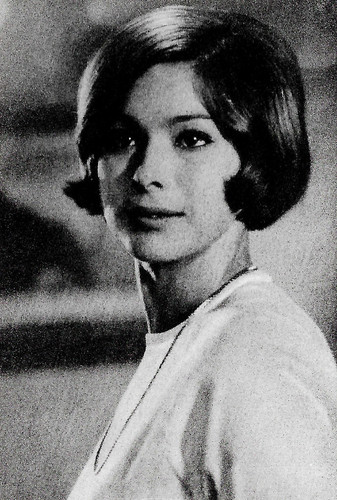
East-German collectors card in the 'Neu im Kino' series by VEB Progress Film-Vertrieb, Berlin, no. 500/6/68. Monika Gabriel in Wir lassen uns scheiden/We Are Getting Divorced (Ingrid Reschke, 1968).
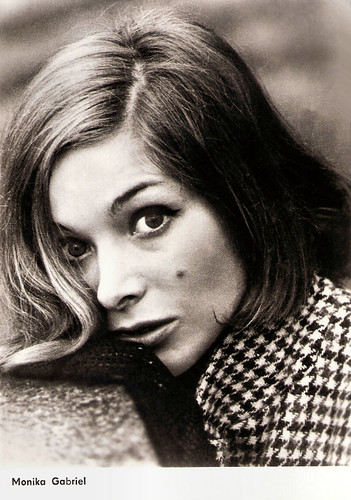
East-German postcard by VEB Progress Film-Vertrieb, Berlin, no. 3047, 1968. Photo: Balinski.
In 1971, when Wolfgang Kieling returned to the Federal Republic of Germany, Monika Gabriel also received an exit permit. Her final GDR film was Anflug Alpha 1/Approach Alpha I (János Veiczi, 1971) with Alfred Müller and Polish-born actor Stefan Lisewski.
From then on, Monika Gabriel mainly played in television productions such as episodes of Krimi series like Dem Täter auf der Spur/The Perpetrator on the Trail (Jürgen Roland, 1972), Tatort/Crime Scene (1975) and Derrick (1977).
She also appeared in the TV film Die Rakete/The Rocket (Dieter Wedel, 1975) and she had guest spots in such series as St. Pauli-Landungsbrücken/St. Pauli-Jetties (1979), Auf Achse/On Axis (1981), Der König und sein Narr/The King and His Fool (Frank Beyer, 1981) with Wolfgang Kieling and Götz George, Kreisbrandmeister Felix Martin/ Fire Chief Felix Martin (Harald Philipp, 1982) also with Kieling, and Eine Klasse für sich/A Class of its Own (Frank Strecker, 1984).
In 1985, she played her last TV role in an episode of the TV series Berliner Weiße mit Schuß/Berliner Weisse with a Shot (Wilfried Dotzel, 1985) with Günther Pfitzmann and Brigitte Mira.
Monika Gabriel also worked as a synchronisation director, dialogue author and voice actor. She lent her voice to numerous prominent international colleagues, among others Jill Clayburgh, Charlotte Rampling, Stella Stevens and Liv Ullmann. In addition, her voice was heard on many radio plays. She was the German voice of Teela in the Masters of the Universe Radio play (1984-1987).
Monika Gabriel was married four times: to the actors Stefan Lisewski, Armin Mueller-Stahl and Wolfgang Kieling (until 1975) and in a fourth marriage with the TV director Wilfried Dotzel. In 1992, she married Dotzel, but he died a year later. She never remarried again. At the age of 63, Monika Gabriel succumbed to cancer in 2007 in Berlin-Spandau. She was buried in Falkensee.
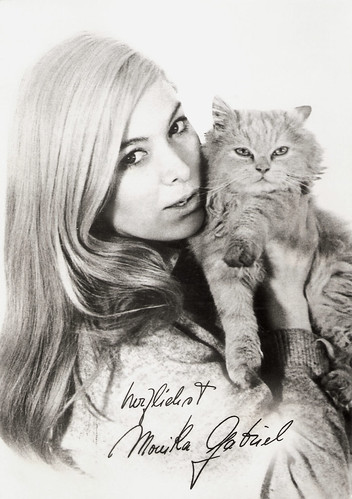
Big East-German card by VEB Progress Film-Vertrieb, Berlin, no. 246/698. Photo: Linke.
Scene from Berlin um die Ecke (1965). Source: occ4m (YouTube).
Sources: Jim Morton (East German Cinema Blog), DEFA Film Library, Wikipedia (German) and IMDb.
This post was last updated on 27 April 2024.

East-German postcard by VEB Progress Film-Vertrieb, Berlin, no. 3320, 1968. Photo: Schwarz.

East-German postcard by VEB Progress Film-Vertrieb, Berlin, no. 3324, 1969. Photo: Schwarz.
The emperor’s new clothes
Monika Gabriel was born in Eichenbriick, near Posen (now Poznań) in Germany (now Poland) in 1943. From 1949 on, she grew up in Falkensee, a city near the Baltic Sea, where she began to take ballet lessons at the age of eleven.
From 1957 to 1961 she trained as a professional dancer at the Academy for Artistic Dance and the Staatliche Ballettschule Berlin. From 1962 on, she also played small parts in stage productions at the Berlin Metropol Theater, where she was later transferred to major roles in musical productions like Cole Porter’s 'Küß mich, Kätchen!' (Kiss Me Kate).
However, she was known by the East German public for her roles in many film and television productions. In 1962, she made her film debut at the DEFA as a page in the fairy tale film Das Kleid/The Robe (Konrad Petzold, 1962) based on Hans Christian Andersen’s fairy tale The Emperor’s New Clothes. Sadly the film was banned by the GDR government as its planned release coincided with the building of the Berlin Wall. Officials saw the film as too critical of the state. In the next years, she played in the popular Stacheltier stunt film short s Stacheltier: Engel, Sünden und Verkehr/Porcupine: Angels, Sins and Traffic (Horst Seemann, 1963) and Stacheltier: Liebe braucht keine PS/Porcupine: Love Doesn’t Require HP (Horst Seemann, 1964).
Gabriel’s first major role was in Gerhard Klein and Wolfgang Kohlhaase’s Berlin um die Ecke/Berlin Around the Corner (1965), the fourth film in their Berlin Film series. At the East German Cinema Blog, Jim Morton writes: "Unfortunately, this was the same year that the 11th Plenum occurred. By the time the film was finished in 1966, the 11th Plenum had started their ‘Kahlschlag’ (literally ‘clear cutting’), and the film was promptly rejected and shelved. The officials called it ‘dishonest,’ which is an odd thing to say considering it’s one of the most honest films to ever come out of East Germany. They also called it ‘anti-socialist’—an even more absurd claim since the motivation of the main character is his desire to see equity achieved. (…) Like most of the films banned during the 11th Plenum, Berlin Around the Corner didn’t get an official release until after the wall came down, although it did receive a limited screening in 1987. It officially premiered in 1990 to positive reviews."
Next Monika Gabriel appeared in Ein Lord am Alexanderplatz/A Lord at Alexanderplatz (1967), Wir lassen uns scheiden/We’re Getting Divorced (Ingrid Reschke, 1967) about the impact of divorce on children, and Jungfer, Sie gefällt mir/Maiden, You Please Me (Günter Reisch,1969), with a script by Jurek Becker based on Heinrich von Kleist’s Der zerbrochene Krug. Monika Gabriel fell in love with her co-star in the film, the West German actor Wolfgang Kieling, who had recently moved to the GDR. In the following year, they married.

East-German collectors card in the 'Neu im Kino' series by VEB Progress Film-Vertrieb, Berlin, no. 500/6/68. Monika Gabriel in Wir lassen uns scheiden/We Are Getting Divorced (Ingrid Reschke, 1968).

East-German postcard by VEB Progress Film-Vertrieb, Berlin, no. 3047, 1968. Photo: Balinski.
Exit permit
In 1971, when Wolfgang Kieling returned to the Federal Republic of Germany, Monika Gabriel also received an exit permit. Her final GDR film was Anflug Alpha 1/Approach Alpha I (János Veiczi, 1971) with Alfred Müller and Polish-born actor Stefan Lisewski.
From then on, Monika Gabriel mainly played in television productions such as episodes of Krimi series like Dem Täter auf der Spur/The Perpetrator on the Trail (Jürgen Roland, 1972), Tatort/Crime Scene (1975) and Derrick (1977).
She also appeared in the TV film Die Rakete/The Rocket (Dieter Wedel, 1975) and she had guest spots in such series as St. Pauli-Landungsbrücken/St. Pauli-Jetties (1979), Auf Achse/On Axis (1981), Der König und sein Narr/The King and His Fool (Frank Beyer, 1981) with Wolfgang Kieling and Götz George, Kreisbrandmeister Felix Martin/ Fire Chief Felix Martin (Harald Philipp, 1982) also with Kieling, and Eine Klasse für sich/A Class of its Own (Frank Strecker, 1984).
In 1985, she played her last TV role in an episode of the TV series Berliner Weiße mit Schuß/Berliner Weisse with a Shot (Wilfried Dotzel, 1985) with Günther Pfitzmann and Brigitte Mira.
Monika Gabriel also worked as a synchronisation director, dialogue author and voice actor. She lent her voice to numerous prominent international colleagues, among others Jill Clayburgh, Charlotte Rampling, Stella Stevens and Liv Ullmann. In addition, her voice was heard on many radio plays. She was the German voice of Teela in the Masters of the Universe Radio play (1984-1987).
Monika Gabriel was married four times: to the actors Stefan Lisewski, Armin Mueller-Stahl and Wolfgang Kieling (until 1975) and in a fourth marriage with the TV director Wilfried Dotzel. In 1992, she married Dotzel, but he died a year later. She never remarried again. At the age of 63, Monika Gabriel succumbed to cancer in 2007 in Berlin-Spandau. She was buried in Falkensee.

Big East-German card by VEB Progress Film-Vertrieb, Berlin, no. 246/698. Photo: Linke.
Scene from Berlin um die Ecke (1965). Source: occ4m (YouTube).
Sources: Jim Morton (East German Cinema Blog), DEFA Film Library, Wikipedia (German) and IMDb.
This post was last updated on 27 April 2024.
No comments:
Post a Comment